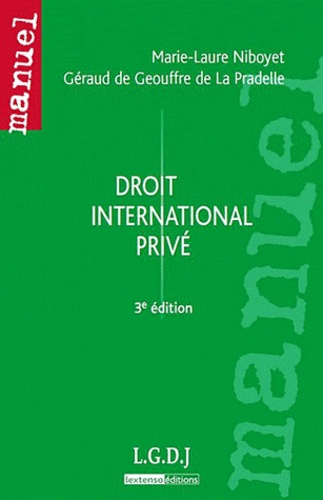Symeonides on Choice of Law in American Courts in 2011
Dean Symeon C. Symeonides (Willamette University – College of Law) has posted Choice of Law in the American Courts in 2011: Twenty-Fifth Annual Survey on SSRN. It is, as usual, to be published in the American Journal of Comparative Law (Vol. 60, 2012). Here is the abstract:
This is the 25th Annual Survey of American Choice-of-Law Cases. It is intended as a service to fellow teachers and students of conflicts law, both within and outside the United States. The Survey covers cases decided by American state and federal appellate courts in 2011. The following are some of the cases discussed:
• Three Supreme Court decisions, one on general jurisdiction, one on specific jurisdiction, and one holding that the Federal Arbitration Act preempts state court rulings that protected consumers by refusing to enforce certain class-arbitration waivers.
• Two state supreme court cases refusing to enforce arbitration clauses that waive tort claims arising from gross negligence and criticizing the Supreme Court for “tendentious reasoning” and for creating new doctrines “from whole cloth.”
• A New York case struggling with the Neumeier rules in a case involving the same pattern as Schultz, and a California case worthy of Traynor’s legacy in delineating the extraterritorial reach of California statutes.
• A Delaware case holding that Delaware has an interest in “regulating the conduct of its licensed drivers,” even when they drive in states with lower standards; a conflict between a dram shop act and an anti-dram shop act; and a product liability case in which a driver who crushed his car after taking a sleeping pill prevailed on the choice-of-law question.
• A case enforcing a foreign arbitration and choice-of-law clause prospectively waiving a seaman’s federal statutory rights, even though there was little possibility for a subsequent review of the arbitration award.
• Several cases illustrating the operation of four competing approaches to statutes of limitation conflicts.
• A case rejecting a claim that a Sudanese cultural marriage was invalid because the groom had paid only 35 of the 50 cows he promised as dowry to the bride’s father. • Two cases recognizing Canadian same-sex marriages.
• A case holding that the court had jurisdiction to terminate a father’s parental rights without in personam jurisdiction over him, as long as the children were domiciled in the forum state.
• A case holding that a state’s refusal to issue a revised birth certificate listing two unmarried same-sex partners as the child’s parents after an adoption in another state did not violate the Full Faith and Credit clause.
• A case characterizing as penal and refusing to recognize a sister-state judgment imposing a fine for a violation of zoning restrictions.
• Several cases involving sex offenders required by sister-state judgments to register their place or residence, or terminating the obligation to register.
• Four federal appellate decisions holding that corporate defendants can be sued under the Alien Tort Statute for aiding and abetting in the commission of international law violations.
 The list of speakers at the workshop on
The list of speakers at the workshop on  UNIDROIT
UNIDROIT The third edition of the manual of Marie-Laure Niboyet and Géraud Geouffre de la Pradelle (both professors at Paris Ouest Nanterre La Défense University) on the French conflict of laws was published earlier this fall.
The third edition of the manual of Marie-Laure Niboyet and Géraud Geouffre de la Pradelle (both professors at Paris Ouest Nanterre La Défense University) on the French conflict of laws was published earlier this fall.